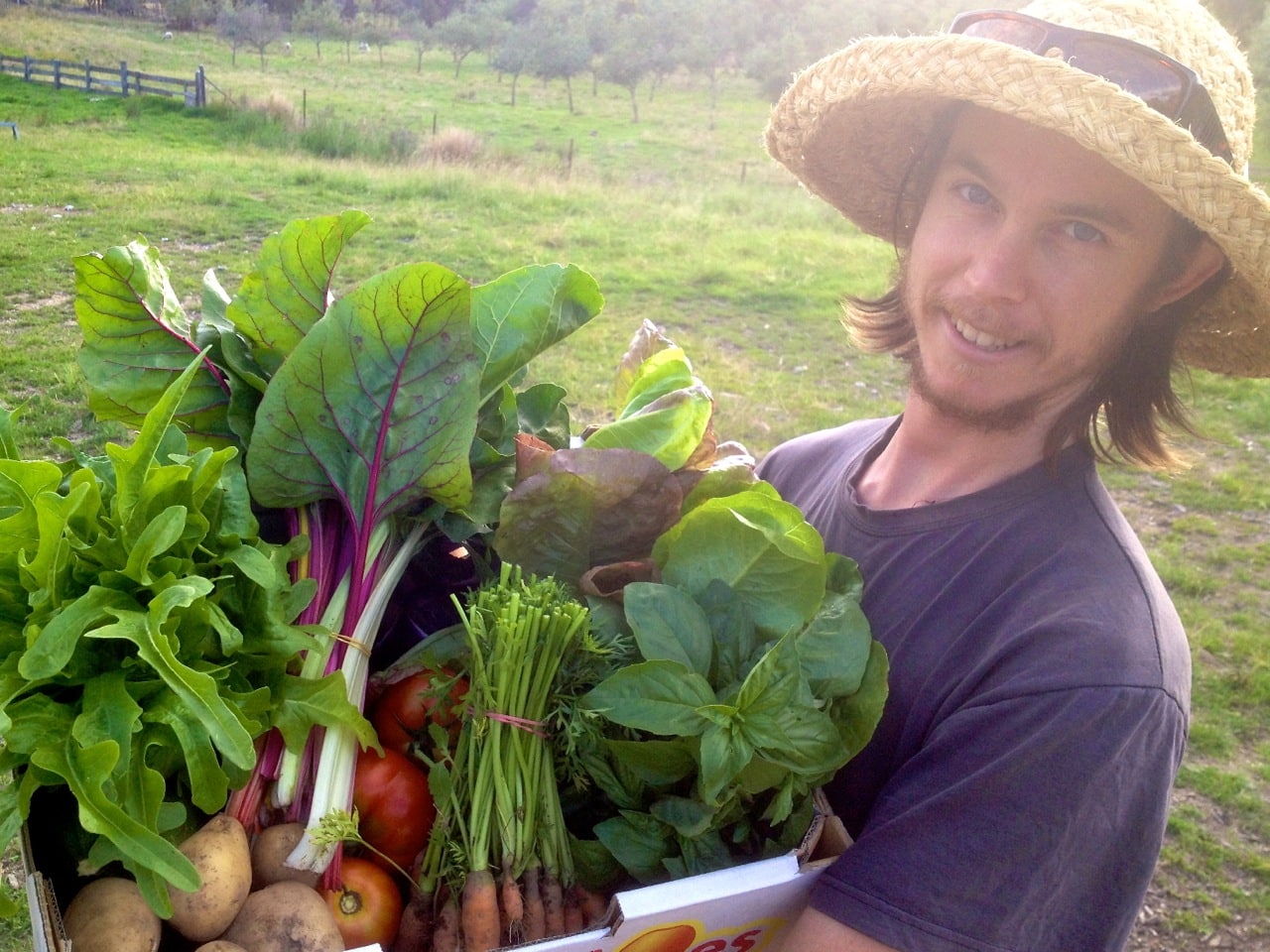
We think it is high time we started introducing you to the network of awesomeness that is the growers and doers we work with, and whom we take inspiration from.
These are the folks we know and love who spend their days wrangling, organising and producing clean food in small, localised food systems. So that we have alternatives to the supermarket duopoly, and so that essential farming knowledge and skills remain in our communities.
First up is Michael Hewins, Milkwood Farm’s very own mofo market gardener…
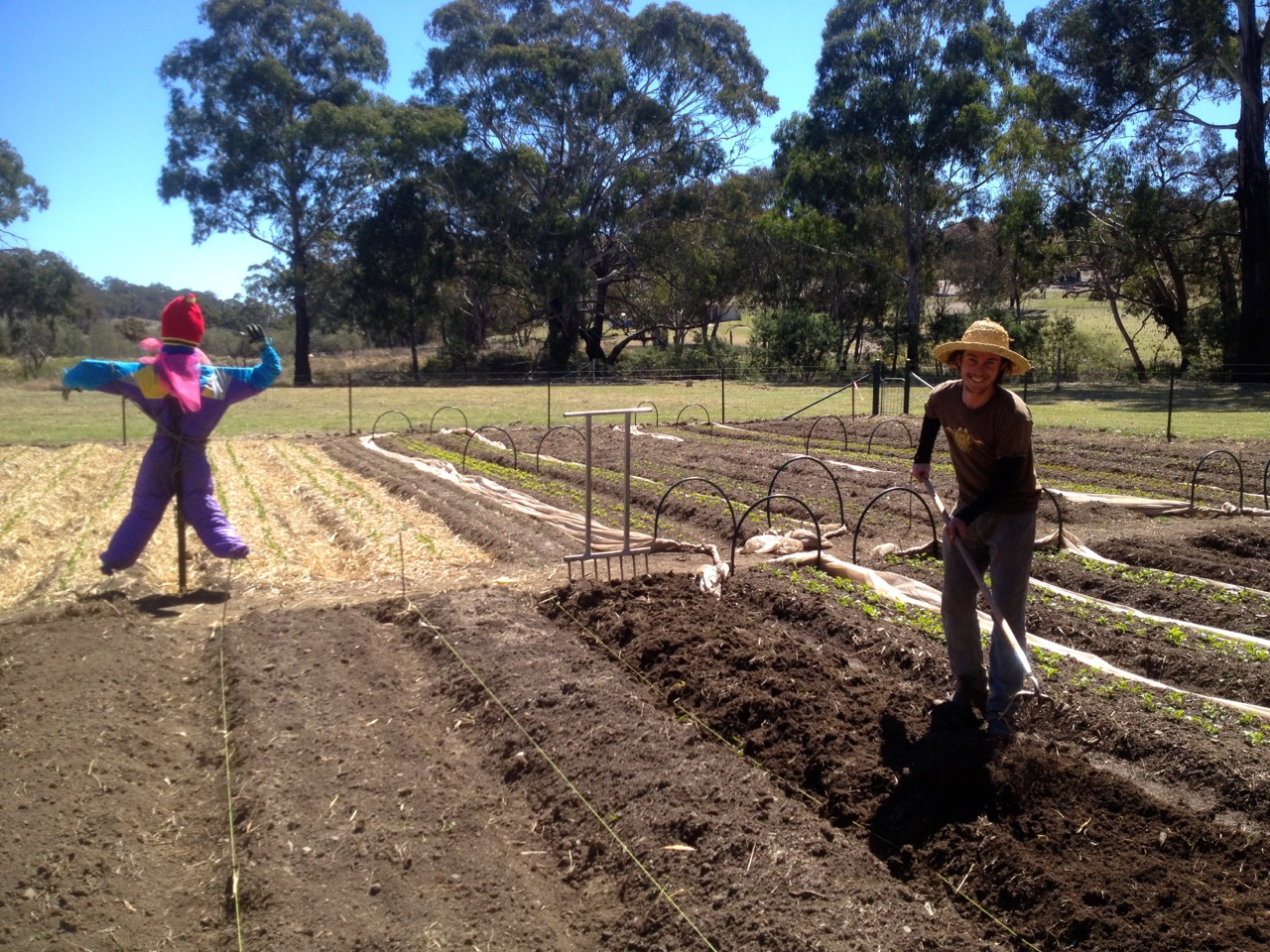
Michael in the Milkwood garden in early Spring
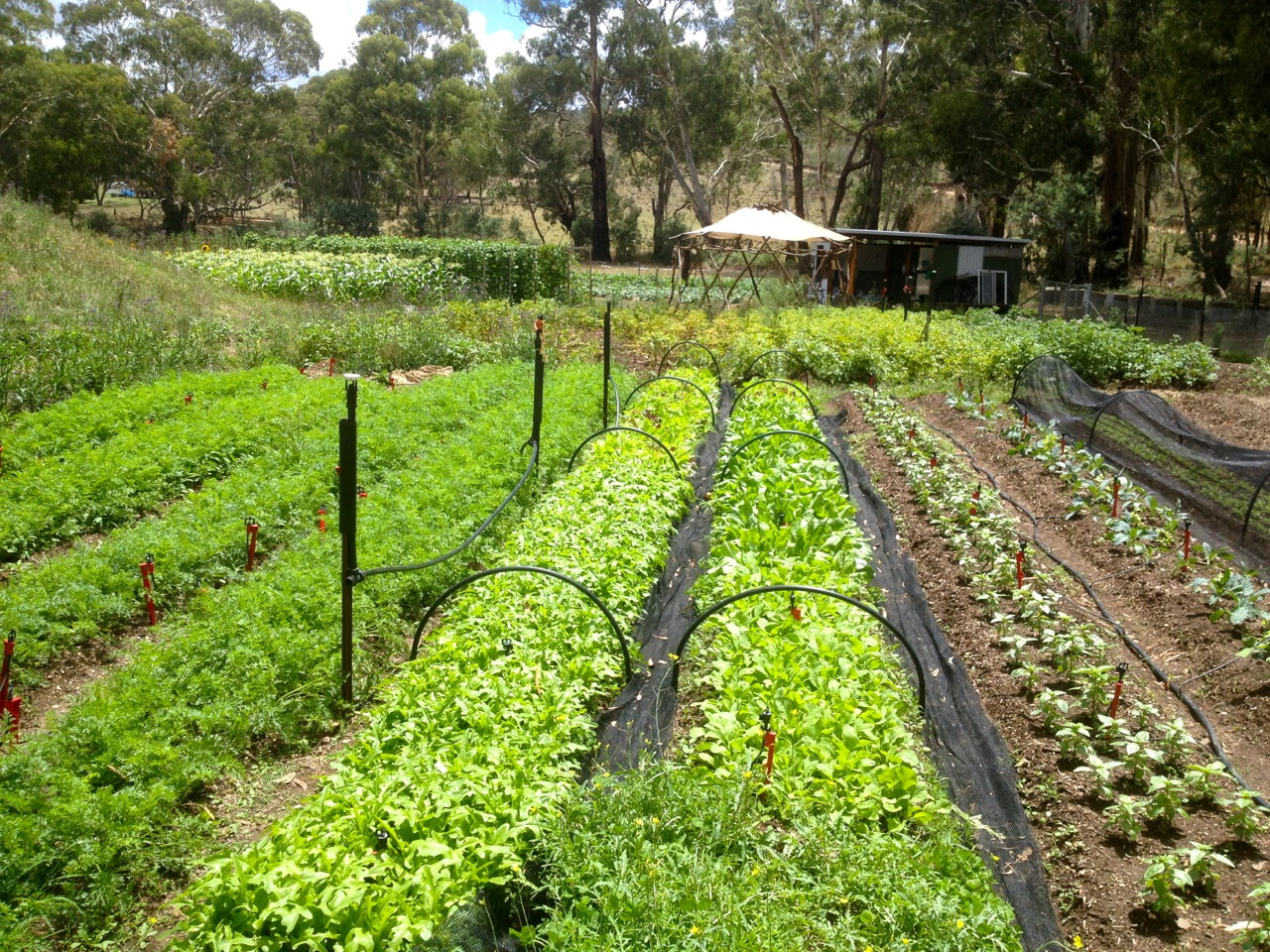
And the same place, by mid-summer…
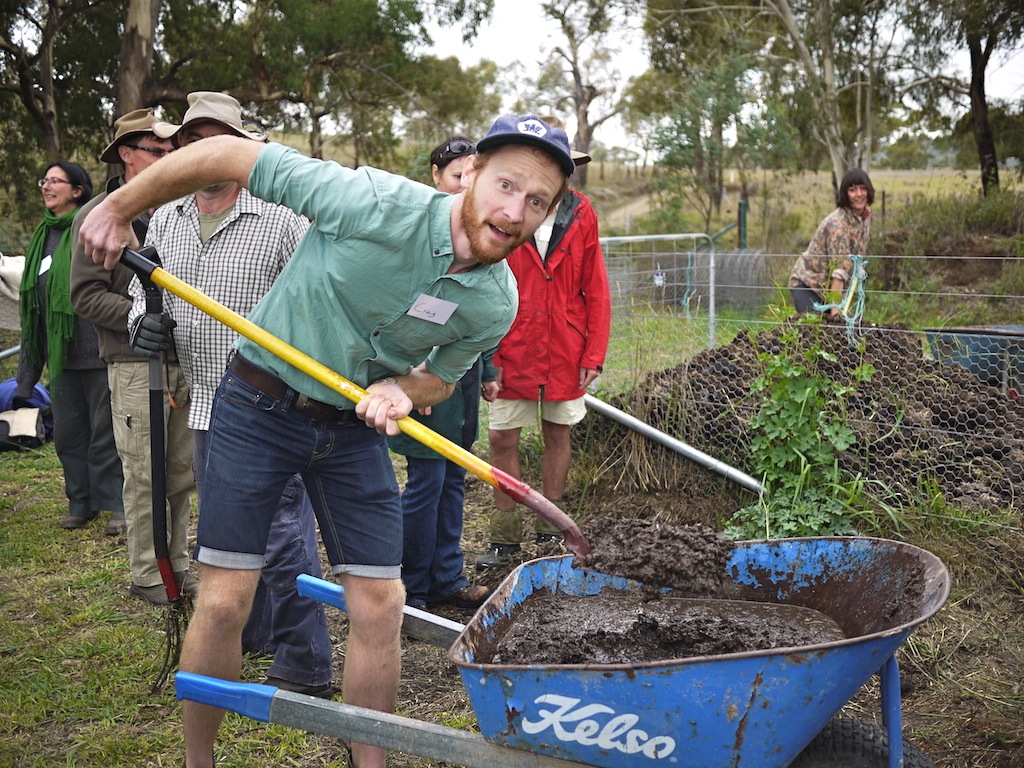
Future Market Gardeners learning the delights of making compost…
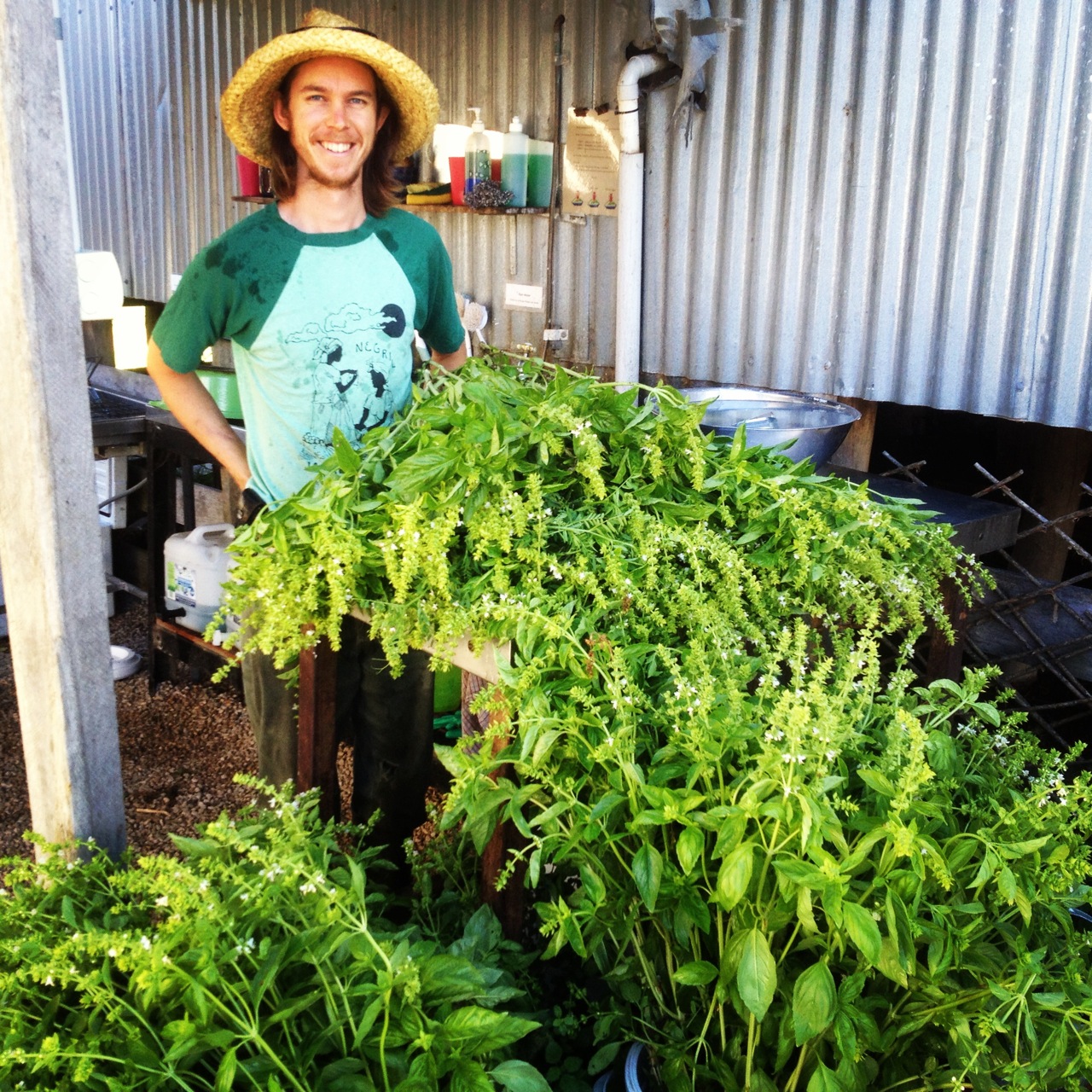
Please state your name for the record, and where you’re from…
My name is Michael Hewins. I grew up in the suburbs on the Gold Coast in Queensland, but have lived much of my adult life in the Northern Rivers of NSW
At what age did you take the plunge to become a full-time (or part time) grower?
I was 24 when I first decided to try small scale Market Gardening as a full time gig. It hasn’t been until the last couple of years that I have considered it more of a serious occupation.
What was your first year of ‘serious growing’ like?
My first season of growing for market was exciting and at the same time stressful. It wasn’t until I put myself in a position of relying upon the system I had started to craft that I realised how much you put on the line dealing with fluctuating weather, markets and personal energy levels. It emphasised how planning is integral.
I found it challenging moving from being a ‘backyard gardener’ to now essentially a business person and a ‘commercial grower’. The planning and skill set involved in making that transition is often not taught in common streams of education.
Growing the produce is one thing, but being able to make a livelihood from it is something that was only actually realised in later seasons once I got my head around what makes a small scale market garden profitable, particularly regarding making better ‘business orientated decisions’.
I would surmise that my first season of growing was a HUGE learning experience, which I am very grateful for.
What was the land-use arrangement for your first growing project?
I was growing on someone else’s land, and in exchange they received fresh produce. It was very informal, which is fine when your starting out. The land was found through personal networks.
When I started looking it was surprising how much vacant land is out there that owners are willing to just have something useful and productive occupying it. Many owners aren’t necessarily looking for monetary exchange, they just wanted to see it be used.
What is the land use arrangement for your current growing project?
I currently grow at Milkwood Farm, in the central west of NSW. I occupy just under 1/2 an acre of land in total to provide hands-on training for future growers, as well as to produce for Milkwood Permaculture’s education enterprise and homestead.
I am employed by Milkwood Permaculture as their ‘Market Gardener’ to provide this service, which is an incredibly rare situation.
The land is owned by the family and the cost and expense of running such a project is the responsibility of Milkwood, I am employed to make it happen. Most Market Gardeners, I would say if not all Market Gardeners are self employed and either leasing or growing on their own land.
Significant inspirations and/or mentors throughout your early years?
Tim Winton, previously of the Permaforest Trust, has definitely been a large influence on my development into systems thinking, specifically using the core principles of permaculture and Tims pattern language, it has shaped how I interact with the world in a big way.
The crew at Wollongbar Agricultural College in Lismore NSW were absolutely amazing when I was studying and developing knowledge of Organic Agriculture and what it takes to run a small scale organic farm.
Of course Eliot Coleman and Michael Ableman have been big influences, mostly being pillars of inspiration through their writings.
There were a lot of farms and individuals that I had the pleasure of WWOOFing and working with when I was initially getting started that were all influences in many ways. That was a great time of exposure to systems being setup, systems well established and systems falling apart……
I still believe observation and being immersed within a project, whether your own or someone else’s, is one of the best ways to learn…
Where do you see the future of Market Gardening in Australia going? Where would you like to see it go?
It is hard to say where the practice of small scale Market Gardening is going within Australia, it is definitely gaining interest and becoming more common.
We currently still live in a very wealthy country, and the major food system that currently functions seems to be well imbedded in its process, infrastructure and its familiarity to the consumer that it is unlikely to change any time soon.
Small scale Market Gardening for the most part is still considered a ‘peasants way of life’ and it seems for the majority, there doesn’t seem to be any foundational reason for food to relocalize yet, e.g.; food shortages, energy constraints etc.
With energy sources still ‘cheap’ and available, those that drive modern agriculture, the perceived cost of change is still greater than the perceived cost of staying the same.
In saying that, small scale farming and specifically ‘Organic’ food and the organics sector within Australia is growing. There is clearly a movement of people, even if small, coming up that are more conscious consumers, often from an ethical ‘for the greater good’, or ‘health related’ decision making basis.
It is often these people that are looking to make change on a community level. I believe if there are any changes within the next 10 years for Market Gardening within Australia it will likely be the slow infusion of moving the practice to be more integrated within small communities in the form of community or urban Farming.
It is likely this would be driven by small minorities of conscious consumers and activists wanting to better their situation for themselves and their community regarding their food source.
I believe this movement will make currently foreign concepts of ‘buying groups’, ‘community supported agriculture,’ ‘box schemes’ or the myriad of other ways of producing and delivering fresh food on a community scale more common and available to the majority, even if only initially for the reason that the food is better quality…. other than a necessity to meet environmental or economic constraints.
Urban farming and community farming are the directions I would like to see the common practice of Market Gardening go.
I would like to see it integrated into communities; the practice, the lifestyle, the culture of it, as a real way of producing volumes of food, generating right livelihoods and creating a culture around our food source.
Growing where the people are makes far more sense when it comes to creating an abundant system using the inherent opportunities and resources that exist in urban environments.
What’s the biggest thing you wish you knew about market gardening right at the start?
Small business management, particularly ‘marketing’ and ‘market assessment’. How to run a small business and make better business related decisions.
If you were talking to a first or second year grower, what would be the things you’d be itching to say ‘make sure you do/dont…’
If you’re starting out…make sure Market Gardening or small scale farming is something you actually want to do, and not just a reaction to ungrounded perceptions or ideas. It is hard work and not for everyone; go work on a few farms and operations before you jump in.
Take the time to see how people are making it work, what their situation is, niches etc… and then ask yourself “is this still something I want to do”. If you find it is something you want to do, always in every instance…
- Start small, with what you can manage and work your way up, build as the market is calling for it.
- Make sure you do your market research THOROUGHLY!!!!
- Make sure your initial ‘idea’ is at least somewhat grounded in reality, it is too common to see enthusiasm and that youthful abundance of energy drive what are just really bad decisions.
- Seek professional guidance….
Do you think you’ll still be growing in 10 years time?
Market Gardening, or ‘Community Scale Food Production’ is addictive! The practice of cultivating good food to feed my community brings me joy and makes sense regardless of whether its an occupation or not…
Favourite 3 books for beginner growers
- Eliot Coleman – New Organic Grower (for understanding the practice)
- Michael Ableman – From the Good Earth (for inspiration)
- Sharing the Harvest – A citizens guide to Community Supported Agriculture (an example of a great model that works)
Favourite resources for beginner growers
- Cornell University’s publications
- DPI agfacts VIC (ignore the use of chemicals, there is some info on organics)
Michael teaches a range of awesome courses in growing good food, including the Intro to Market Gardening at Milkwood Farm, and Serious Backyard Veggies courses in Sydney.
There’s a great snippet of Michael talking about the Milkwood market garden in our new video below…
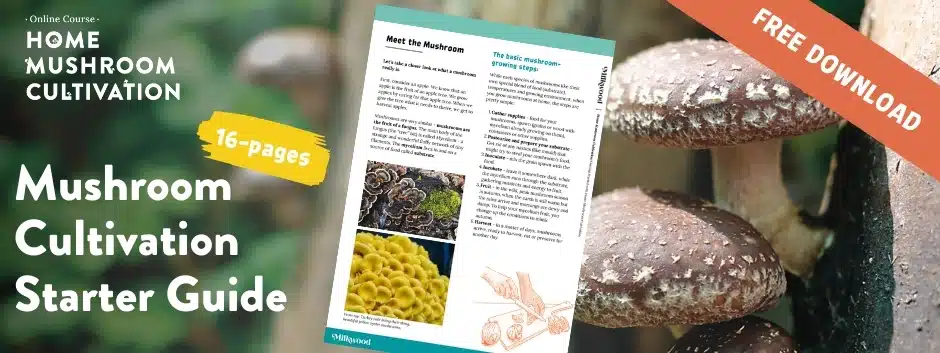
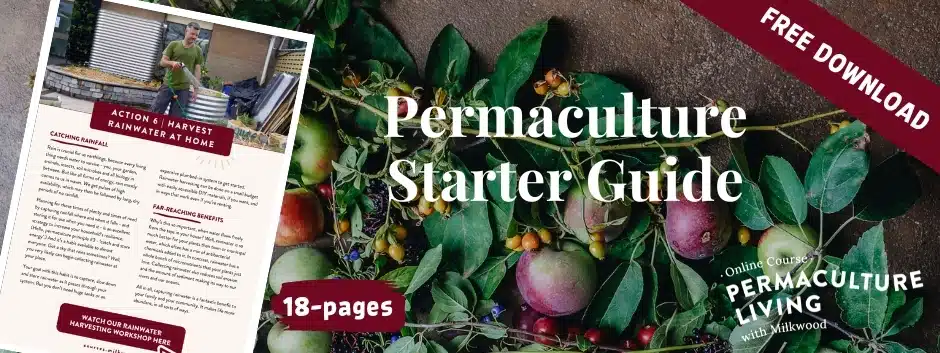
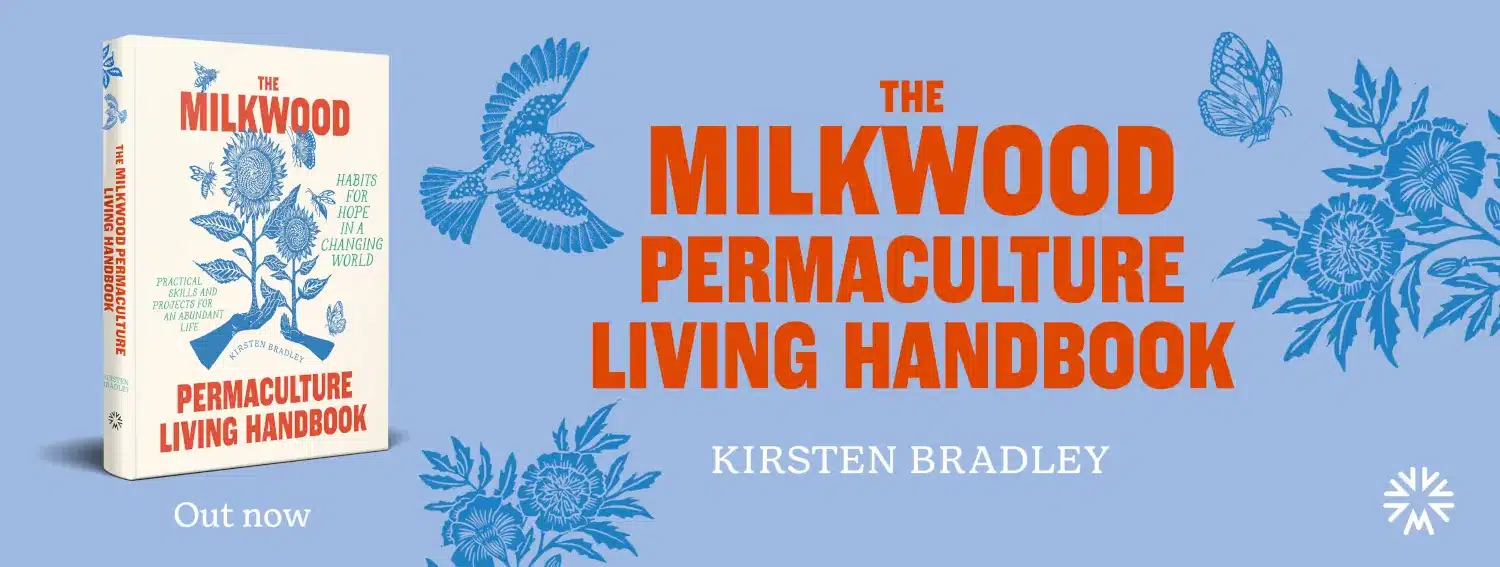
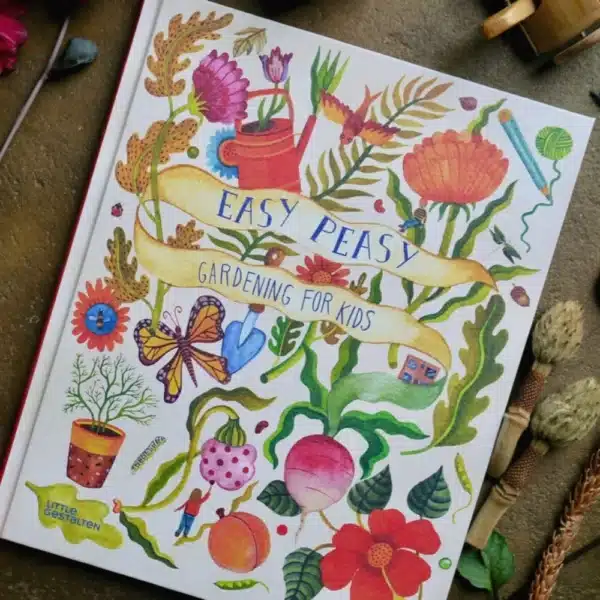
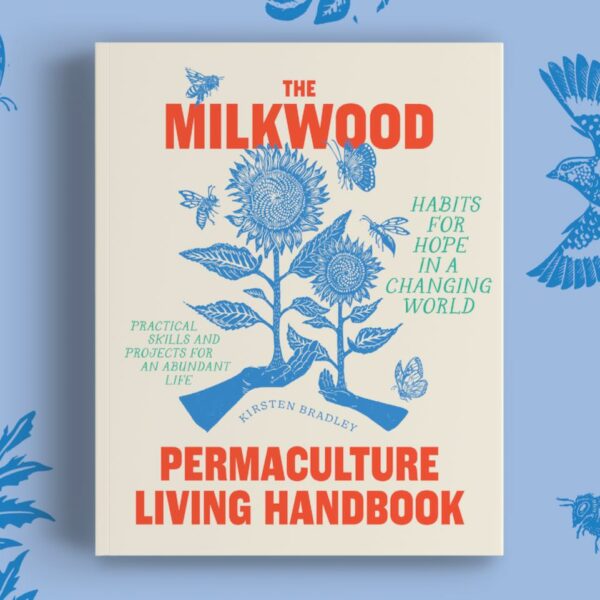
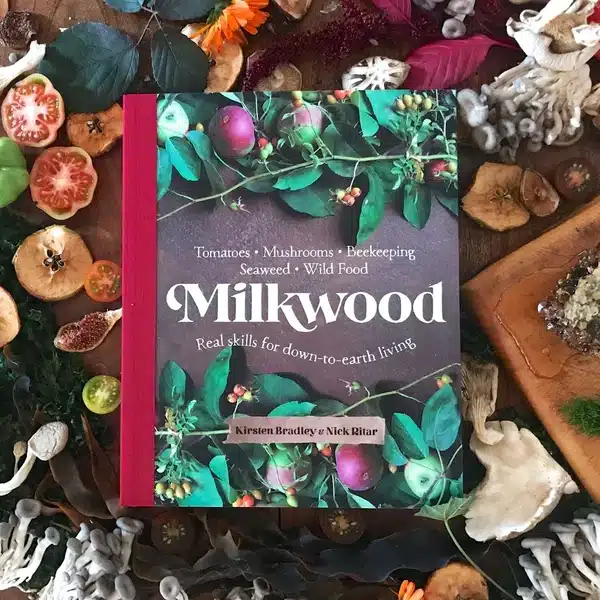






great article ,really interesting to hear from michael.
What am inspiring young man. I wish I had been that insightful at his age.